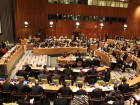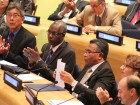On Sunday, September 27th, Prime Minister Rui Maria de Araújo, spoke before world leaders at the United Nations, sharing some of the lessons learned by Timor-Leste in an Interactive Dialogue on “Building Effective Accountable and Inclusive Institutions.”
He explained “During the infancy of our democracy we hosted an inordinate international presence, spending vast amounts of money in the name of peace and development. Yet it was poverty that was growing, not our economy. ”
”
After the crisis of 2006, he said Timor-Leste had to “come to terms with our situation and seeking to take control of our own destiny, we set about building the foundations of an inclusive, representative and responsive state.”
In this process he noted that some of Timor-Leste’s decisions “caused disquiet amongst partners, largely because the international system was out of tune with the peacebuilding and statebuilding realities we faced.”
Timor-Leste had to chart it’s own course.
 The Prime Minister acknowledged that although there were many challenges ahead the government had made ground in building state institutions that were focussed on the needs of the people and had strengthened capacity to serve those needs.
The Prime Minister acknowledged that although there were many challenges ahead the government had made ground in building state institutions that were focussed on the needs of the people and had strengthened capacity to serve those needs.
The national experience of development partnerships and institution building, both positive and negative since 1999 has enabled Timor-Leste to make a contribution as a respected, authentic and pragmatic voice to the 2030 Sustainable Development Agenda.